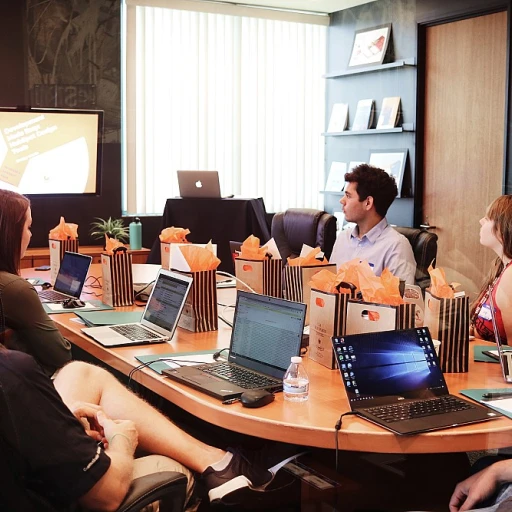
Understanding the impact of hr tech 2024 on job interviews
How HR Technology is Reshaping Interviews in 2024
The landscape of job interviews is undergoing a significant transformation, driven by rapid advancements in HR technology. In 2024, organizations are leveraging digital tools and platforms to streamline talent acquisition and management, making the interview process more efficient and data-driven. This shift is not just about adopting new tech; it’s about rethinking how businesses connect with talent and manage their workforce in a global, digital-first environment.
- AI-powered assessments are now a staple in many interview processes, offering deep insights into candidate skills and potential. These technologies help leaders make more informed decisions, but also raise questions about fairness and transparency.
- Virtual interview platforms have become the norm, especially after major events like Unleash America in Las Vegas and Tech Europe, where the future of work and digital transformation are key topics. Candidates must adapt to new formats and expectations, from video calls to interactive assessments.
- People analytics and data-driven decision-making are shaping the future of talent management. HR leaders use these tools to identify trends, improve employee engagement, and support change management across their organizations.
At global events such as technology conferences and conference expos, experts discuss how cutting edge HRtech is influencing every stage of the hiring journey. The focus is on creating a seamless experience for both candidates and employers, while addressing critical issues like data privacy and ethical use of technology.
For those preparing for HR job interviews, understanding these changes is essential. The integration of social media, digital platforms, and advanced analytics means that candidates need to be tech-savvy and ready to engage with new tools. To get a deeper understanding of the evolving landscape and essential insights for HR job interviews, check out this guide to essential insights for HR job interviews.
As digital transformation accelerates, staying informed about the latest technologies and trends is crucial for anyone looking to succeed in the HR field. The next sections will explore how AI-powered assessments, virtual interview platforms, and data privacy concerns are shaping the future of HR interviews and what candidates can do to adapt.
The rise of AI-powered assessments in the interview process
AI reshaping the interview landscape
AI-powered assessments are rapidly transforming the way organizations approach job interviews. This shift is not just about efficiency; it’s about leveraging cutting edge technology to gain deeper insights into talent, skills, and potential fit within the workforce. As HRtech continues to evolve, AI-driven tools are becoming central to talent acquisition and management strategies, especially for businesses aiming to stay ahead in a competitive global market.
What candidates can expect from AI assessments
AI assessments are now a common feature in digital interview platforms. These technologies analyze candidate responses, both verbal and written, and sometimes even non-verbal cues. The goal is to provide a more objective evaluation, reducing unconscious bias and helping leaders make data-driven decisions. Here’s what you might encounter:
- Automated video interviews: AI analyzes your answers, tone, and facial expressions.
- Skill-based simulations: Digital tasks that reflect real work scenarios.
- Personality and cognitive tests: Algorithms assess traits and problem-solving abilities.
These innovations are often discussed at major events like Unleash America in Las Vegas and Tech Europe, where HR professionals explore the future of work and the role of technology in shaping talent management.
Balancing technology and the human touch
While AI brings efficiency and consistency, it’s important to remember that human resources is still about people. The best HRtech solutions combine digital transformation with a human-centric approach, ensuring that technology supports, rather than replaces, meaningful interactions. Leaders and change management experts at global conference expos emphasize the need for balance, especially as businesses navigate the future of employee engagement and talent acquisition.
Staying informed and prepared
For candidates, understanding how AI assessments work is crucial. Familiarize yourself with the types of technologies used, and practice responding in digital formats. Social media and HR technology conference sessions often provide valuable tips and real-world examples. For a deep dive into how smart HR is transforming the interview experience, explore resources that highlight both the opportunities and challenges of this ongoing transformation.
Virtual interview platforms: what candidates need to know
Key Features of Modern Virtual Interview Platforms
Virtual interview platforms have become a cornerstone of the digital transformation in human resources. As organizations adapt to a more tech-driven workforce, these platforms are shaping the future of talent acquisition and management. Candidates now encounter a range of technologies designed to streamline the interview process, enhance employee engagement, and support global talent management strategies.
- Integrated video and audio tools: Most platforms offer seamless video conferencing, making it easier for candidates and HR leaders to connect regardless of location. This is especially relevant for global businesses and remote-first teams.
- Automated scheduling: AI-powered scheduling tools reduce back-and-forth emails, saving time for both candidates and HR professionals.
- Assessment integrations: Many platforms now include built-in assessments or connect with people analytics tools, allowing for a deep dive into candidate skills and cultural fit.
- Data privacy and security: With the rise of digital interviews, data management and privacy have become top priorities. Leading platforms comply with international standards, ensuring candidate information is protected.
- Social media connectivity: Some solutions allow candidates to import professional profiles, making the application process more efficient and transparent.
What Candidates Should Expect
Attending a virtual interview is now standard practice at many technology conferences, HRtech events, and even large-scale conference expos like Unleash America in Las Vegas or Tech Europe. Here’s what candidates should keep in mind:
- Technical readiness: Test your equipment and internet connection before the session. Many platforms offer a pre-interview tech check to avoid disruptions.
- Professional environment: Choose a quiet, well-lit space. Backgrounds matter, as they reflect your attention to detail and professionalism.
- Engagement strategies: Virtual interviews can feel less personal. Use clear communication, maintain eye contact with the camera, and show enthusiasm for the role and company’s digital transformation journey.
- Understanding platform features: Familiarize yourself with the platform’s interface. Features like screen sharing or digital whiteboards may be used for case studies or presentations.
Leveraging Virtual Interviews for Success
Virtual interview platforms are not just about convenience—they’re about harnessing cutting-edge technologies to improve talent acquisition and management. Candidates who adapt to these changes demonstrate agility and readiness for a future work environment shaped by ongoing transformation. For more insights on creative ways to stand out in HR job interviews, explore strategies that align with the latest trends in digital HRtech.
Data privacy concerns in hr tech 2024
Understanding Data Privacy Risks in HR Technology
As HR technology continues its rapid transformation, data privacy has become a central concern for both candidates and organizations. The integration of cutting edge tech, such as people analytics and AI-driven talent management, means that more personal and sensitive information is collected and processed during job interviews. This shift is shaping the future of work and talent acquisition, making it essential for candidates to be aware of how their data is handled.
Key Data Privacy Challenges for Candidates
- Volume of Data Collected: Digital interview platforms and AI-powered assessments gather a wide range of data, from video recordings to behavioral analytics. This information is often stored and analyzed to improve talent management and employee engagement strategies.
- Transparency Issues: Not all organizations clearly communicate how candidate data will be used, stored, or shared. This lack of transparency can create uncertainty and erode trust in the hiring process.
- Global Regulations: With the global workforce and remote interviews becoming the norm, candidates may be subject to different data privacy laws depending on the location of the company or the technology provider. Events like Unleash America in Las Vegas and Tech Europe conferences often highlight the need for compliance with regulations such as GDPR and CCPA.
What Candidates Should Look For
- Clear Privacy Policies: Before engaging with any HR tech platform, review the privacy policy to understand what data is collected and how it will be used. Reputable companies, especially those showcased at global technology conferences and expo events, will provide detailed information.
- Consent Mechanisms: Ensure that you are given the opportunity to provide informed consent before your data is collected. This is a standard practice among leaders in digital transformation and talent acquisition.
- Data Security Measures: Look for insights into how your data is protected. Encryption, secure storage, and limited access are all signs of a responsible HR tech provider.
How HR Tech is Responding
HR technology providers are increasingly aware of the need for robust data privacy management. Many are investing in advanced security protocols and regularly updating their systems to comply with international standards. Conference sessions and deep dives at events like Unleash America and Tech Europe often focus on the latest trends in data protection, offering valuable insights for both business leaders and job seekers.
Practical Tips for Candidates
- Ask about data retention policies during interviews or onboarding sessions.
- Be cautious about sharing sensitive information on social media or digital platforms linked to the interview process.
- Stay informed about your rights regarding data privacy, especially if interviewing with companies that operate globally.
As the future of HR tech continues to evolve, understanding and managing data privacy risks will remain a crucial part of the job interview experience. Staying informed and proactive can help candidates navigate this digital transformation with confidence.
Adapting your interview strategy for a tech-driven process
Embracing a Digital-First Mindset
As HR technology continues to transform the interview process, candidates need to rethink their approach. The shift to digital platforms, AI-powered assessments, and people analytics means that traditional interview preparation is no longer enough. Understanding how to present yourself in a tech-driven environment is now a key part of talent acquisition and management.
Key Strategies for Success in Tech-Driven Interviews
- Familiarize Yourself with Digital Tools: Many organizations use cutting edge virtual interview platforms and people analytics to evaluate candidates. Take time to explore popular technologies used in HRtech, such as video interview software and online assessment tools. This will help you feel more confident and reduce technical issues during the session.
- Highlight Digital Competencies: Showcase your ability to adapt to digital transformation and leverage technology in the workplace. Be ready to discuss experiences with remote collaboration, social media for business, or using data for decision-making. These insights demonstrate your readiness for the future of work.
- Prepare for AI-Powered Assessments: Automated screening and AI-driven evaluations are becoming standard. Practice responding to structured interview questions and timed assessments. Review your resume for keywords that align with talent management and workforce transformation, as these may be flagged by AI systems.
- Understand Data Privacy: With the rise of people analytics and digital platforms, your personal data is often collected and analyzed. Review privacy policies and know your rights regarding data usage. This awareness is increasingly important as global regulations evolve and HR leaders prioritize ethical management of candidate information.
- Engage Authentically: Even in a digital setting, human resources professionals value genuine interaction. Focus on clear communication, active listening, and thoughtful responses. Employee engagement remains a priority, whether the interview is in-person or virtual.
Staying Ahead in a Rapidly Changing Landscape
Attending HR technology conferences, such as Unleash America in Las Vegas or Tech Europe, can provide valuable insights into the latest trends shaping the future of talent acquisition and management. These events offer deep dives into topics like change management, digital transformation, and the use of data in shaping future workforce strategies. By staying informed and adaptable, candidates can position themselves as forward-thinking contributors to any business or organization.
In summary, adapting your interview strategy for a tech-driven process means embracing new technologies, understanding the role of data, and demonstrating your ability to thrive in a digital environment. This approach will help you stand out in a competitive, global workforce shaped by ongoing transformation and innovation.
Common pitfalls and how to avoid them in hr tech interviews
Recognizing and Overcoming Common Tech Interview Challenges
The rapid transformation of human resources through digital technology has brought both opportunities and new hurdles to the interview process. As organizations embrace cutting edge HRtech, candidates often face unique challenges that can impact their performance and outcomes. Here are some of the most common pitfalls in tech-driven HR interviews, along with practical insights to help you navigate them:- Over-reliance on Automated Assessments: Many companies now use AI-powered tools for talent acquisition and people analytics. While these technologies can streamline the process, they sometimes miss the nuances of human potential. Candidates should prepare to demonstrate both technical skills and soft skills, ensuring their personality and experience shine through beyond the data points.
- Technical Glitches During Virtual Interviews: With the rise of digital interview platforms, technical issues can disrupt the flow. Always test your equipment and internet connection before the session. Familiarize yourself with the platform, whether it’s used at a global tech conference or a local business event, to minimize surprises.
- Misunderstanding Data Privacy: As HRtech evolves, so do concerns about data privacy. Candidates should be aware of how their information is managed and stored, especially when engaging with international companies or during large-scale events like Unleash America in Las Vegas or Tech Europe. Read privacy policies and ask questions if anything is unclear.
- Neglecting Digital Presence: Social media and digital footprints play a growing role in talent management. Leaders and hiring managers often review online profiles to assess employee engagement and cultural fit. Keep your professional profiles updated and aligned with your resume.
- Failing to Adapt to New Interview Formats: The future of work is shaped by continuous change management and digital transformation. Be ready for unconventional interview formats, such as asynchronous video responses or interactive conference expo sessions. Practice adaptability and stay informed about the latest HR technologies shaping the workforce.
| Challenge | How to Avoid |
|---|---|
| Automated Assessments | Showcase both technical and interpersonal skills; prepare examples that highlight your adaptability and business insights. |
| Technical Issues | Test all tech in advance; have a backup plan for connectivity problems. |
| Data Privacy Concerns | Review privacy policies; clarify how your data will be used during the process. |
| Digital Footprint | Update your social media and professional profiles; ensure consistency with your application. |
| New Interview Formats | Research the company’s process; practice with mock digital interviews or attend relevant technology conferences for exposure. |













